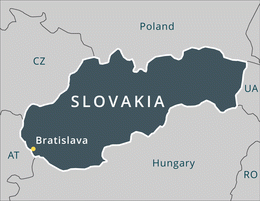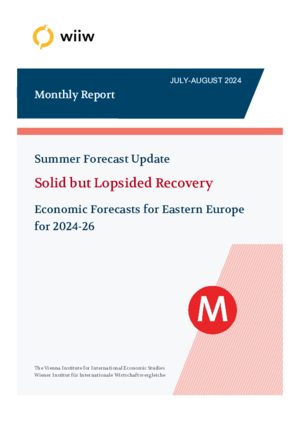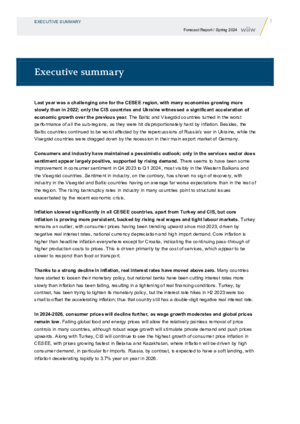Slovakia

After a figure of 1.6% in 2023, in Q1 2024 Slovakia experienced unexpectedly rapid GDP growth of 2.7% year on year, making it one of the fastest-growing countries in the EU. This robust performance was driven by domestic demand. Household consumption recovered from last year’s high inflation, bolstered by a 5.6% rise in real wages in Q1, as inflation subsided to 2.4% in April 2024. Government consumption and investment also expanded. On the other hand, net exports dragged growth down, with imports of goods and services rising faster than exports in real terms. The labour market is in reasonable shape: employment continued to increase in Q1, while unemployment dropped to a historically low level. The labour shortages have led to more visas being offered to attract foreign workers. However, industry in general – and the automotive industry in particular – were not doing well at the beginning of the year. Production had dropped markedly and new orders were significantly down. Nevertheless, the forecast for this year has been revised slightly upward, given the unexpectedly positive developments observed in Q1. We now expect growth to reach 2% in 2024, 2.2% in 2025 and 2.6% in 2026. This improvement will be driven by increased household confidence, growing income and a strong labour market, all of which will boost household demand. However, poor growth in external markets – particularly in Slovakia’s main export markets of Germany and Czechia – will hamper a stronger performance. In addition, growth prospects are being overshadowed by domestic political changes and a harsher political climate following the attempted assassination of Prime Minister Robert Fico. The budget deficit is expected to be very high this year, and will decline only slowly in the coming years, thus postponing fiscal consolidation.
| |
|
|
|
FORECAST* |
| Main Economic Indicators | 2021 | 2022 | 2023 | 2024 | 2025 | 2026 |
| Population, 1000 persons | 5447 | 5432 | 5427 | . | . | . |
| GDP, real change in % | 4.8 | 1.9 | 1.6 | 2.0 | 2.2 | 2.6 |
| GDP per capita (EUR at PPP) | 23860 | 25220 | 27430 | . | . | . |
| Gross industrial production, real change in % | 10.7 | -4.5 | 1.5 | . | . | . |
| Unemployment rate - LFS, in %, average | 6.8 | 6.1 | 5.8 | 5.8 | 5.6 | 5.4 |
| Average gross monthly wages, EUR | 1211 | 1304 | 1430 | . | . | . |
| Consumer prices, % p.a. | 2.8 | 12.1 | 11.0 | 2.8 | 3.4 | 3.4 |
| Fiscal balance in % of GDP | -5.2 | -1.7 | -4.9 | -6.0 | -5.0 | -4.0 |
| Public debt in % of GDP | 61.1 | 57.7 | 56.0 | . | . | . |
| Current account in % of GDP | -4.0 | -7.3 | -1.6 | -1.3 | -0.9 | -1.0 |
| FDI inflow, EUR m | 2299 | 3873 | -303 | . | . | . |
| Gross external debt in % of GDP | 134.2 | 103.0 | 96.1 | . | . | . |
Basic data are continuously updated.
* Forecasts are changed beginning of January, April, July and November.
See Press Conferences.
publication_icon
Monthly Report No. 7-8/2024
Vasily Astrov, Alexandra Bykova, Rumen Dobrinsky, Selena Duraković, Meryem Gökten, Richard Grieveson, Doris Hanzl-Weiss, Gabor Hunya, Branimir Jovanović, Niko Korpar, Sebastian Leitner, Isilda Mara, Olga Pindyuk, Sandor Richter, Bernd Christoph Ströhm, Maryna Tverdostup, Zuzana Zavarská and Adam Żurawski
wiiw Monthly Report No. 7-8, July-August 2024
45 pages including 5 Tables and 12 Figures
Details
publication_icon
Executive summary
Olga Pindyuk
in: The Crisis is Over, but its Scarring Effects are Hindering Recovery
wiiw Forecast Report No. Spring 2024, April 2024 , pp. I-VII
Details
After a figure of 1.6% in 2023, in Q1 2024 Slovakia experienced unexpectedly rapid GDP growth of 2.7% year on year, making it one of the fastest-growing countries in the EU. This robust performance was driven by domestic demand. Household consumption recovered from last year’s high inflation, bolstered by a 5.6% rise in real wages in Q1, as inflation subsided to 2.4% in April 2024. Government consumption and investment also expanded. On the other hand, net exports dragged growth down, with imports of goods and services rising faster than exports in real terms. The labour market is in reasonable shape: employment continued to increase in Q1, while unemployment dropped to a historically low level. The labour shortages have led to more visas being offered to attract foreign workers. However, industry in general – and the automotive industry in particular – were not doing well at the beginning of the year. Production had dropped markedly and new orders were significantly down. Nevertheless, the forecast for this year has been revised slightly upward, given the unexpectedly positive developments observed in Q1. We now expect growth to reach 2% in 2024, 2.2% in 2025 and 2.6% in 2026. This improvement will be driven by increased household confidence, growing income and a strong labour market, all of which will boost household demand. However, poor growth in external markets – particularly in Slovakia’s main export markets of Germany and Czechia – will hamper a stronger performance. In addition, growth prospects are being overshadowed by domestic political changes and a harsher political climate following the attempted assassination of Prime Minister Robert Fico. The budget deficit is expected to be very high this year, and will decline only slowly in the coming years, thus postponing fiscal consolidation.


